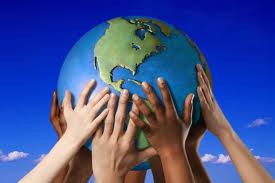Almost every major religious tradition has an understanding of human health, healing or wholeness as a process of becoming focused on others. In Yoga this is understood as the dharma. The dharma is our duty or obligation to live in right relationship with others. This involves caring for others but also standing up for those who are vulnerable.
Judaism, too, has a tradition of right relationship and preferential option for those who are weak and vulnerable. Many times in the Bible God tells the Israelites that in order to be in right relationship with God they must be in right relationship with others. This entails being able to see the world through others’ eyes. This tradition carries over into Christianity as well.
Even Western medicine advocates volunteering or focusing on others as one of the steps in treating depression.
In our extremely individualistic, North American culture many get caught up in a personal, private spirituality. Christians may refer to “my salvation” or “your salvation.” But theologian Anthony Gittins, CSSp had this to say in his scripture reflection for January 2, 2011:
”Charisms are the Holy Spirit’s gift, but they are intended for others, and thus for giving, for sharing. Because they are not just for ourselves, they must not be selfishly hoarded. Paul emphasizes this when addressing the community at Ephesus, but, in a way, it provides a leitmotif for today’s feast and readings. “For us, and for our salvation” is the way we acknowledge the Incarnation: the coming of Jesus, and that means not simply ‘many,’ but ‘all.’
So each of us, recipients of the divine gift, must also be givers. What we have received, we must give and share with others. The privatization of spirituality – the “me and Jesus” mentality – is bogus and unChristian unless it is counterbalanced by a centrifugal missional outreach. Jesus fills us up so that we can be emptied out as he was, for the good of the world. As we become depleted, God replenishes us; as we are filled, so we can be emptied out again.”
“Salvation” (from the Latin word salve) means healing and wholeness. This is holiness. Service and a focus on others are the means by which we enter into the process of salvation and healing in Christianity. It begins in this life, with our consent, and continues beyond our death. Salvation is both Christianity’s promise and its goal: to make us truly human, who we are meant to be. To make us whole.
Like the orchids in the photo, unless the entire plant system is healthy, none of the individual flowers will bloom or survive. The health of each flower depends on the health of the whole plant.
As the French say: Salut! To your health!
Roxanne
P.S. Tomorrow a short trip to Paris, then I think we shall go to Dublin (via this blog of course!).



